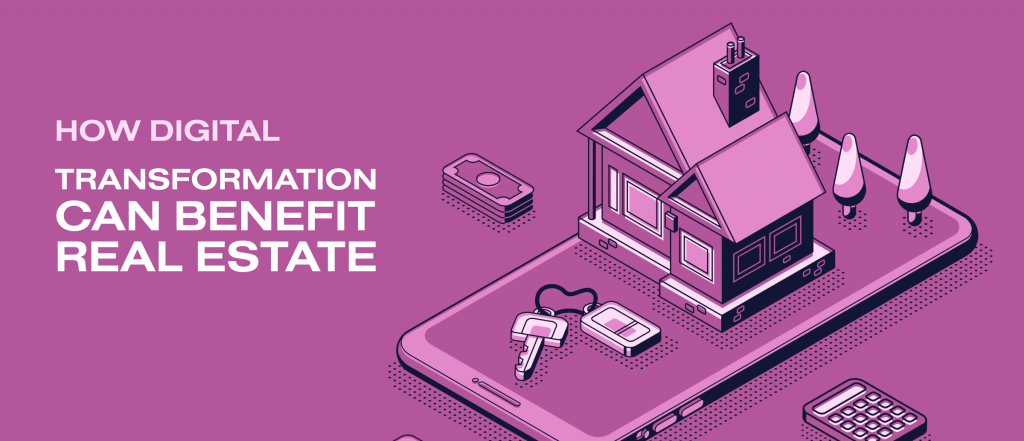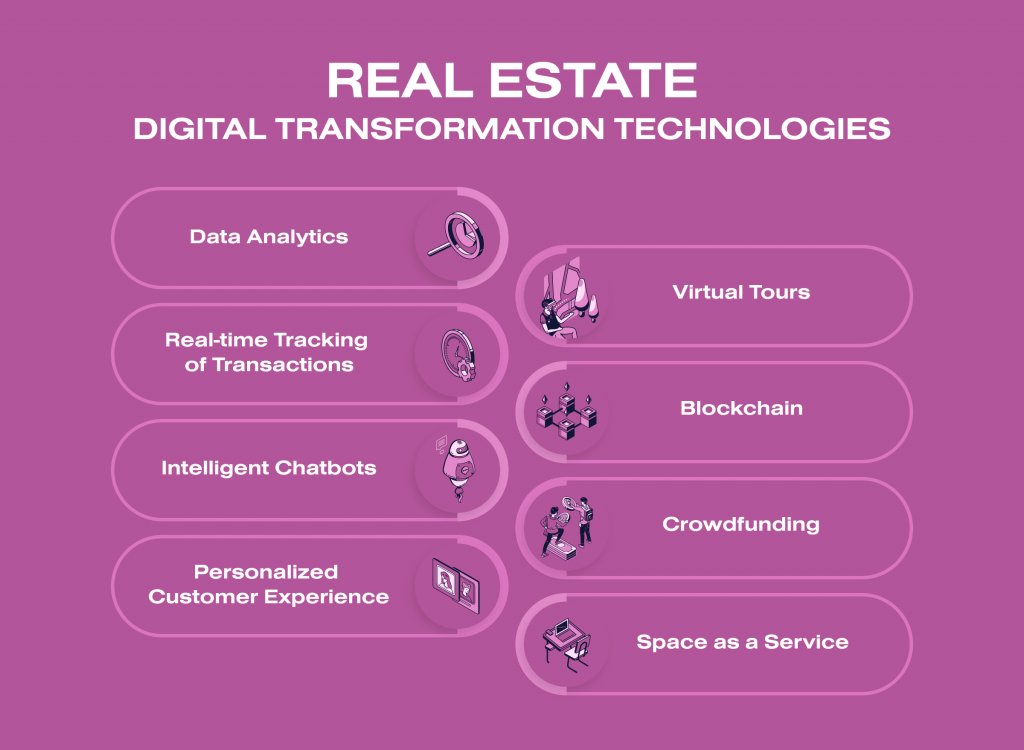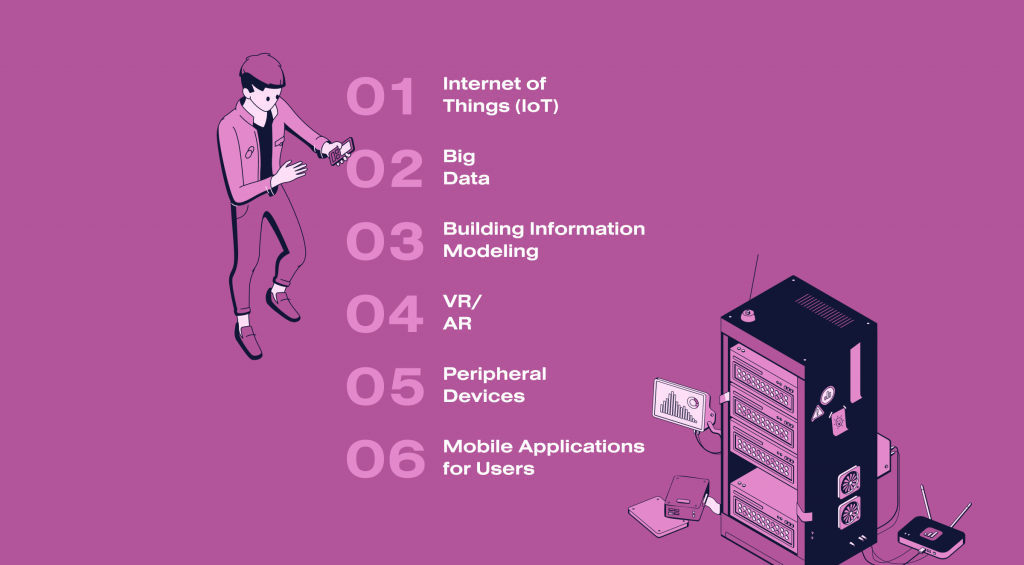Digital transformation is actively taking over all business sectors, and real estate is no exception. The real estate industry faces a significant challenge: transitioning from traditional brick-and-mortar operations to digital processes. Remarkably, 58% of real estate companies have indicated that they’ve already adopted a digital strategy. 41% of buyers state they are ready to purchase properties without seeing them. In order to thrive in today’s real estate market, swift action is imperative.
This article discusses what is real estate digital transformation, 6 technologies that drive digital transformation in the real estate industry, and the prospects of real estate digitalization.
Key points
Why does the real estate market need digital solutions?

Today, every business domain can only do with digital solutions, especially such a complex and systematic business as real estate. The use of IT technologies allows to optimize processes, reduces time and financial costs of the company, and increases its capabilities and competitiveness. Also, the digitalization of the industry makes it possible to avoid errors related to the human factor.
It is essential to understand that not all companies can create customized IT solutions for themselves for the following reasons:
- Lack of a strong development team
- Lack of budget for development
- Lack of expertise in the non-core business processes
Therefore, the question is not why the real estate market needs digital solutions but what a real estate company should do. We mean create its own IT department or use ready-made industry solutions that exist on the market.
In the real estate domain, technologies already exist for most aspects: design, construction control, commercial, management reporting, sales, and commissioning. Seamless systems, such as property management systems, also emerge that provide integrated solutions.
What IT solutions are available in the real estate market?

Today, there are more than 500 real estate solutions for various areas: construction, sales, marketing, document management, procurement and tracking of construction materials, design automation, and operation of commissioned facilities. There are 2 main directions in which digital startups are developing: helping specialists by automating processes that are usually performed manually and replacing specialists with technologies.
Today, real estate companies compete with each other on the speed of introducing digital solutions. Of course, it is still possible to meet real estate companies who conduct their sales in Excel. Still, we can confidently state that in the coming year, most real estate businesses will start using IT technologies in one way or another. Many owners of real estate companies are in such a hurry to implement digital solutions that they do so without prior preparation.
What factors inhibit the real estate market digitalization?
Currently, there are no significant inhibiting factors for real estate market digitalization. Digital transformation can only be hindered by the lack of confidence of specific entrepreneurs in innovations or the lack of money to optimize processes. There are also cases when departments in the company sabotage the implementation of custom real estate CRM.
Six technologies that drive digital transformation in the real estate industry

Here are six technologies that are actively participating in real estate digital transformation.
Internet of Things (IoT)
IoT allows you to make your home smart and improve your utilities. It is a technology that is built on a system of sensors. It collects a lot of information and sends it to a control center. For example, the system can collect meter readings and monitor the amount of water or smoke detectors in the room. The services get an alert when there are unusual changes.
This is one example of how the Internet of Things can improve the home’s service level. On the other hand, the customer gets smart control of many systems, from locks to specific household items – a kettle or a washing machine. Thanks to a smart system built on IoT, the user can optimize their home and control the costs of heat, light, and other resources. Most importantly, he does not worry when traveling whether the iron is turned off or whether he forgot to shut off the gas.
Big Data
Strategic real estate decisions can only be made based on Big Data. It allows you to forecast, analyze, compare, and consider situations from all angles.
Big Data helps to identify the most profitable assets for investment, select partners and technologies, and allocate resources. Statistics and analytics also make it possible to anticipate future events. For example, if construction is planned in a seismically active region, the system will offer several solutions, calculate risks, and help select a business development model.
Smart sensors can simplify the process of building maintenance. Utility staff can receive information not only about a critical condition, such as a burst pipe but also about a possible accident. This is where predictive analytics can help. Working with Big Data opens up new horizons for the real estate business.
Building Information Modeling
BIM technologies provide the ability to model buildings. It is one of the most widespread technologies in the real estate digitalization process. It facilitates the creation of accurate documentation and reduces the risk of errors. Thanks to Big Data, this technology is complemented, making it possible to consider all risks, optimize costs, and calculate the time and cost of work.
The system helps to design building structures, engineering structures, and various infrastructure facilities and to work out communication systems with high precision. What used to take months or even years to complete now takes days.
Digital modeling allows you to develop interior elements, and thanks to convenient visualization, it is easier for companies to sell their services. Imagine that you are not just telling a client about his apartment but showing it. Even at the foundation stage, the user can “walk around” the virtual apartment, arrange the furniture, and “touch” the walls. Synergy with other technologies only enhances this effect.
VR/AR
Augmented reality (AR) and virtual reality (VR) technologies are needed to make Building Information Modeling even more accurate. If before the user could only look at his apartment or office on a tablet or phone, now he can be in it and really touch the interior.
In addition, at the design approval stage, the inspector can review details, point out mistakes, and reduce risks and problems later on. Builders can see what should turn out and how to realize the plan. The architect will work out every detail. And all this can be seen before the foundation is laid and money and time are spent.
Peripheral devices
Until a few years ago, it was believed that the future of the entire digital industry was cloud technology. However, time has shown the disadvantages of cloud technologies. Their centralized architecture can be too slow and create cybersecurity risks.
So, we are seeing a trend toward solutions where computations are performed not in a distant cloud but close to data sources. This can be useful for creating an autonomous control system for a smart home or for organizing workflow on a construction site where there are problems with network access.
Mobile applications for users
To increase sales and enhance marketing, companies are implementing custom mobile applications. This is a communication tool between the management company and the client. With the help of a smartphone, a resident or tenant can ask for help, ask questions, and point out a problem. The management company will be able to provide prompt and high-quality services.
A mobile application is also useful at the construction stage. The investor can see how the work is progressing, monitor the process, and make adjustments. Buyers use a mobile application to choose the layout of an apartment, look at prices, and choose a floor. In the app, you can get advice and even formalize the transaction. This is a powerful tool for interaction with investors and clients.
What are the prospects for real estate digitalization?
We are seeing the parallel development of many incredible technologies of the future. This list includes ML for fraud detection, high-speed 5G networks, and AR/VR. Each such technology can change the entire industry beyond recognition in a year or two.
Imagine a construction management system based on the Internet of Things and 5G, with which you can monitor all the work details and make changes to the parameters of the construction site on the fly. Imagine smart home projects that can diagnose their utilities and signal possible malfunctions before problems arise.
Currently, many players in the market provide quality service for the real estate businesses. Platforms offer convenient tools for project launch and implementation, marketing, quality analytics, and pricing. A rising trend in today’s market is no-code platforms that allow entrepreneurs to implement necessary technologies without interacting with the code.
In the real estate market, more and more companies are actively implementing IT technologies and showing interest in digital startups. At the moment, there is no clear leader in this field. But the sooner you understand the need to digitalize your real estate business, the sooner you will earn more money.
Real estate digital transformation possibilities are limitless. Applying the right technology to solve typical industry problems can yield unexpected results.
Conclusion
To start a digital transformation in real estate, you need to get help from experts. Our SoloWay Tech team can select the best technology stack and develop comprehensive solutions like CRM.
Our analysts conduct research, study the market, competitors, and your business characteristics, and select technologies. Based on the data, we develop a solution emphasizing functionality, appearance, and usability. As a result, you get a ready-made solution for your real estate business. Feel free to contact us right now!




